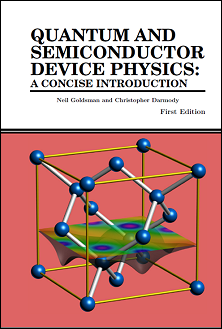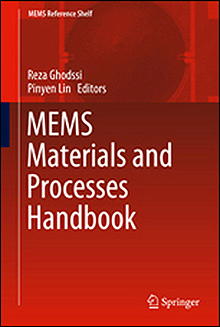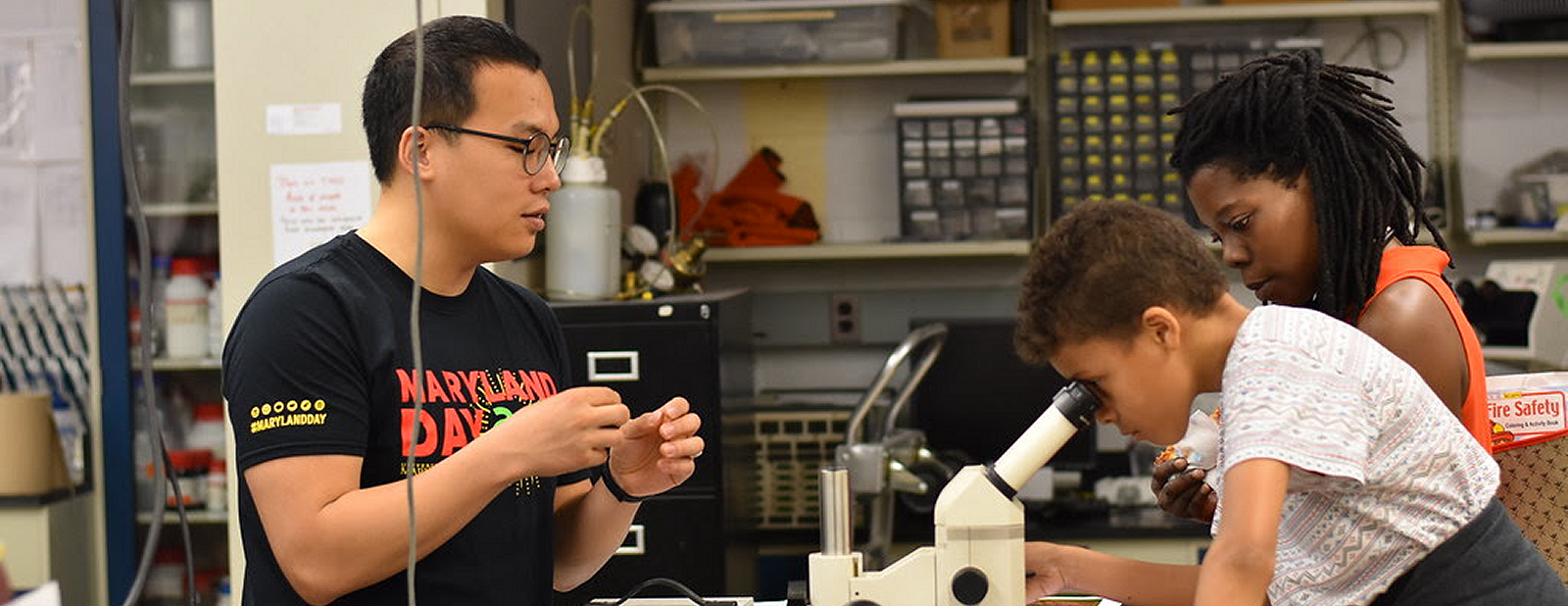
Education
 Quantum and Semiconductor Device Physics: A Concise Introduction
Quantum and Semiconductor Device Physics: A Concise Introduction
Textbook by Neil Goldsman and Christopher Darmody:
Textbook written expressly for UMD ECE Students is an introduction to quantum mechanics and solid-state devices. The first part of the book is an introduction to quantum mechanics that is based on the Schrodinger Wave Equation. It covers the Bohr Atom, Quantum Wells, Tunneling, the Hydrogen Atom, Crystal Structure and Electronic Band Structure. The second part of the book introduces students to electron and hole transport in semiconductors based on Drift and Diffusion. The transport equations are then used to describe the operation of fundamental solid devices including the PN Junction Diode, the Bipolar Junction Transistor (BJT) and the Metal Oxide Semiconductor Field Effect Transistor (MOSFET). The text contains eleven chapters and is designed for a one-semester fourteen-week curriculum for junior level engineering and physical science students.
MEMS Materials and Processes Handbook
Reference book by Reza Ghodssi and Pinyen Lin:
 MEMS Materials and Processes Handbook is a comprehensive reference for researchers searching for new materials, properties of known materials, or specific processes available for MEMS fabrication. The content is separated into distinct sections on ‘Materials’ and ‘Processes’. The extensive ‘Material Selection Guide’ and a ‘Material Database’ guides the reader through the selection of appropriate materials for the required task at hand. The ‘Processes’ section of the book is organized as a catalog of various microfabrication processes, each with a brief introduction to the technology, as well as examples of common uses in MEMs. The book also: Provides a comprehensive catalog of various microfabrication processes, each with a brief introduction to the technology, as well as examples of common uses in MEMS Discusses specific MEMS fabrication techniques such as additive, subtractive, and lithography/patterning, as well as wafer bonding, doping, surface treatment/preparation, and characterization techniques Provides the reader with a quick check list of the advantage/disadvantage of fabrication MEMS Material and Processes Handbook will be a valuable book for researchers, engineers and students working in MEMS and materials processing.
MEMS Materials and Processes Handbook is a comprehensive reference for researchers searching for new materials, properties of known materials, or specific processes available for MEMS fabrication. The content is separated into distinct sections on ‘Materials’ and ‘Processes’. The extensive ‘Material Selection Guide’ and a ‘Material Database’ guides the reader through the selection of appropriate materials for the required task at hand. The ‘Processes’ section of the book is organized as a catalog of various microfabrication processes, each with a brief introduction to the technology, as well as examples of common uses in MEMs. The book also: Provides a comprehensive catalog of various microfabrication processes, each with a brief introduction to the technology, as well as examples of common uses in MEMS Discusses specific MEMS fabrication techniques such as additive, subtractive, and lithography/patterning, as well as wafer bonding, doping, surface treatment/preparation, and characterization techniques Provides the reader with a quick check list of the advantage/disadvantage of fabrication MEMS Material and Processes Handbook will be a valuable book for researchers, engineers and students working in MEMS and materials processing.
Courses We Teach
For more information on the courses listed below, go to their Testudo page.
ENEE303 – Analog and Digital Electronics
Credits: 3
Instructors: Fall 2021: Timothy Horiuchi, Martin Peckerar, Agisilaos Iliadis; Spring 2021: Sahil Shah
Prerequisite: Minimum grade of C- in ENEE205; and permission of ENGR-Electrical & Computer Engineering department.
Restriction: Must be in one of the following programs (Engineering: Electrical; Engineering: Computer).
Conceptual operation of transistors and diodes. Large and small signal operation of BJTs and MOSFETs. Basic transistor configurations. Logic circuits and semiconductor memory. Multi-transistor circuits including differential amplifiers and current mirrors. Frequency response.
ENEE307 – Electronic Circuits Design Laboratory
Credits: 2
Instructor: Neil Goldsman
Prerequisite: Minimum grade of C- in ENEE303; and permission of ENGR-Electrical & Computer Engineering department.
Restriction: Must be in one of the following programs (Engineering: Computer; Engineering: Electrical).
Students will design and test analog and digital circuits at the transistor level. FETs and BJTs will be covered. The laboratory experiments will be tightly coordinated with ENEE303 materials.
ENEE313 & 313H – Introduction to Device Physics
Credits: 3
Instructor: Kevin Daniels
Prerequisite: Minimum grade of C- in ENEE205; and permission of ENGR-Electrical & Computer Engineering department.
Restriction: Must be in one of the following programs (Engineering: Electrical; Engineering: Computer).
Credit only granted for: ENEE312 or ENEE313.
Basic physics of devices including fields in solids, crystal structure, properties of electrons and holes. Current flow in Si using drift-diffusion model. Properties of the pn junction. Properties of devices including BJTs, FETs and their physical characteristics.
ENEE408D (Spr. 2021) – Capstone Design Project: Mixed Signal VLSI Design
Credits: 3
Instructor: Pamela Abshire
Prerequisites: ENEE303, ENEE307, and ENEE313.
This course covers the design of very large scale integrated (VLSI) circuits including analysis and simulation of digital and analog circuits, layout, and component selection. The material involves extensive use of Computer-Aided Design (CAD) tools for circuit simulation and layout and draws upon knowledge from 300-level EE courses Following current industry paradigms, students work in teams to design, thoroughly simulate, and specify physical layout of mixed signal VLSI circuits prior to their fabrication in a foundry.
ENEE408K – Capstone Design Project; Electric Cars
Credits: 3
Instructor: TBA
Prerequisites: ENEE303, Electrical or Computer Engineering seniors in their last year of their program. Recommended co-requisite: ENEE476 or ENEE475.
Restriction: Permission of Electrical & Computer Engineering.
A capstone course on the design of electric cars, which will be designed with the objective to participate in the Formula SAE racing competition. This is a system level design course, which will eventually use a combination of off-the-shelf components. The major components inside the electric car include electric motor, power inverter, drive circuit, battery management system, sensors and encoders etc. This course will also discuss level simulation of electric vehicle along with the electrical components in Autonomy software.
ENEE411 – Advanced Analog and Digital Electronics
Credits: 3
Instructor: Pamela Abshire
Prerequisite: Minimum grade of C- in ENEE303.
Restriction: Must be in one of the following programs (Engineering: Electrical; Engineering: Computer) ; and must have permission of the department.
Credit only granted for: ENEE411 or ENEE419A.
Formerly: ENEE419A.
Examination of analog and digital device models for analysis, design, and simulation of transistor level electronic circuits, emphasizing Metal Oxide Silicon Field Effect Transistors (MOSFETs); fundamental single transistor configurations; frequency response, feedback, and stability of multi-transistor circuits, such as current mirrors, differential amplifiers, voltage references, operational amplifiers and data converters; complementary Metal Oxide Silicon (CMOS) implementations of static and clocked digital as well as mixed signal circuits.
ENEE416 – Integrated Circuit Fabrication Laboratory
Credits: 3
Instructor: Reza Ghodssi
Prerequisite: Minimum grade of C- in ENEE303; and must have earned a minimum grade of regular (letter) C- in all required 200-level ENEE courses; and permission of ENGR-Electrical & Computer Engineering department.
Restriction: Must be in one of the following programs (Engineering: Computer; Engineering: Electrical).
Formerly: ENEE419J.
Characterization of wafers and fabrication steps. Oxide growth, lithography, dopant diffusion, and metal deposition and patterning will be discussed in the lectures and carried out in the lab in fabricating NMOS transistor circuits. The transistor characteristics will be measured and related to the fabrication parameters.
ENEE476 – Renewable Energy
Credits: 3
Instructor: Alireza Khaligh
Prerequisite: Minimum grade of C- in ENEE303; and completion of all lower-divisions ENEE courses with a C- or better.
Restriction: Permission of ENGR-Electrical & Computer Engineering department; and must be in one of the following programs (Engineering: Electrical; Engineering: Computer). Credit only granted for: ENEE419R or ENEE476. Formerly: ENEE419R.
Solar Energy Conversion Systems: History of Photovoltaic (PV) Systems, PV Cell, Module and Array Models and Equivalent Circuits, Characteristic Resistance, Fill Factor, Effects of Parasitic Resistances, Mismatch Effects, Shading, Bypass Diodes, Sun Tracking Systems, Maximum Power Point Tracking (MPPT) Techniques, Isolated and Non-isolated Switch-mode DC/DC for PV Systems, Inverter Design and Control, Sizing the PV Panel and Battery Pack in PV Applications. Wind Energy Conversion Systems: Introduction to Wind Energy Harvesting, Horizontal and Vertical Wind Systems, Fundamentals of Wind Energy Harvesting Systems, Variable Speed and Fixed Speed Wind Energy Conversion Systems (WECS), Wind Turbines and Different Electrical Machines in Wind Applications, Induction Machine and Dynamic Model of Induction Machines, Synchronous Generators and Dynamic Model of SG, Control of Wind Energy Conversion Systems.
Alternating face-to-face/online meeting. See instructor for details.
ENEE600 – Solid State Electronics
Credits: 3
Instructor: Agisilaos Iliadis
Prerequisite: ENEE413; and must have background in elementary quantum mechanics.
Credit only granted for: ENEE600 or ENEE793.
Formerly: ENEE793.
Properties of crystals; energy bands: electron transport theory; conductivity and hall effect; statistical distributions; fermi level: impurities; non-equilibrium carrier distributions; normal modes of lattice vibration and thermal properties of crystals; tunneling phenomena; surface properties.
ENEE601 (Spr 2021) – Semiconductor Devices and Technology Syllabus Repository
Credits: 3
Instructor: Agisilaos Iliadis
Recommended: ENEE413 and ENEE600.
Credit only granted for: ENEE601 or ENEE697.
Formerly: ENEE697.
The principles, structures and characteristics of semiconductor devices. Technology and fabrication of semiconductor devices.
ENEE605 – Design and Fabrication of Micro-Electro-Mechanical Systems (MEMS)
Credits: 3
Instructor: Reza Ghodssi
Credit only granted for: ENEE605 or ENEE719R.
Formerly: ENEE719R.
The goals are to explore the world of Micro-Electro-Mechanical Systems (MEMS) by understanding its design and fabrication aspects.
ENEE611 – Integrated Circuit Design and Analysis Syllabus Repository
Credits: 3
Instructor: Timothy Horiuchi
Recommended: ENEE610.
Credit only granted for: ENEE611 or ENEE696.
Formerly: ENEE696.
Active and passive elements used in semiconductor structures. Design application of linear and digital integrated circuits.
ENEE612 – Advanced Power Electronics Syllabus Repository
Credits: 3
Instructor: Alireza Khaligh
Prerequisite: ENEE303, ENEE475, or ENEE476; or students who have taken courses with comparable content may contact the department.
Credit only granted for: ENEE719B or ENEE612.
Formerly: ENEE719B.
Advanced power electronic converters, techniques to model and control switching circuits, pulse width modulation, resonant switch converters, resonant DC-link converters, series and parallel loaded resonant (SLR, PLR) DC-DC converters, zero voltage switching clamped-voltage (ZVS-CV) converters, ZVS resonant-switch DC-DC converters are explained. In addition, this course deals with small-signal and large-signal modeling and control of switched mode power converters, sliding-mode operation, state space models, generalized state-space averaging, and feedback linearization techniques. Multiple-input converters and their operational principles are explained. Furthermore, practical design procedures for type II and type III compensators with voltage-mode error-amplifier for DC/DC converters are explained.
ENEE614 – Radio Frequency VLSI Circuit Design
Credits: 3
Instructor: Neil Goldsman
Recommended: ENEE611.
This course will give students the knowledge required to analyze, design and lay-out discrete and integrated circuits used in modern radio frequency communications. The course will focus on advanced amplifier concepts, frequency conversion, tuning, and low-noise techniques. Implementation of AM, FM and digital modulation techniques will be covered. Emphasis will be given to CMOS technology as applied to analog VLSI. Advanced applications of SPICE and VLSI design layout tools will be covered.
ENEE704 – Physics and Simulation of Semiconductor Devices
Credits: 3
Instructor: Neil Goldsman
Recommended: ENEE601 and ENEE600; and exposure to quantum mechanics.
Credit only granted for: ENEE694 and ENEE704.
Formerly: ENEE694.
The physics of electron transport in semiconductor devices will be covered. Numerical methods for attaining solutions to transport equations will be explored. Students will also learn how to use CAD tools for semiconductor device design. Nano-electronic devices will be introduced.
ENEE719D – Advanced Topics in Microelectronics; Embedded Machine Learning
Credits: 3
Instructor: Sahil Shah
Prerequisites: ENEE 408D, or equivalent course, or with permission from the Instructor.
It is recommended that you have some knowledge of circuit design and have worked with a (spice or cadence) circuit simulators.
Embedded Machine learning is a course at the intersection of Machine Learning and Embedded Devices. Machine learning algorithms have shown state-of-the-art accuracies to carry out complex tasks such as computer vision, natural language processing, and speech recognition. This coupled with the research and development in low-power embedded devices will enable the mass proliferation of AI-powered IoT devices. We will provide an overview of embedded architectures that enable computing efficiently: ARM based Cortex-M, Neuromorphic processors (True North), Analog architectures (ReRam and FG based), and In-memory computing architectures (SRAM and DRAM based).
See New Courses

